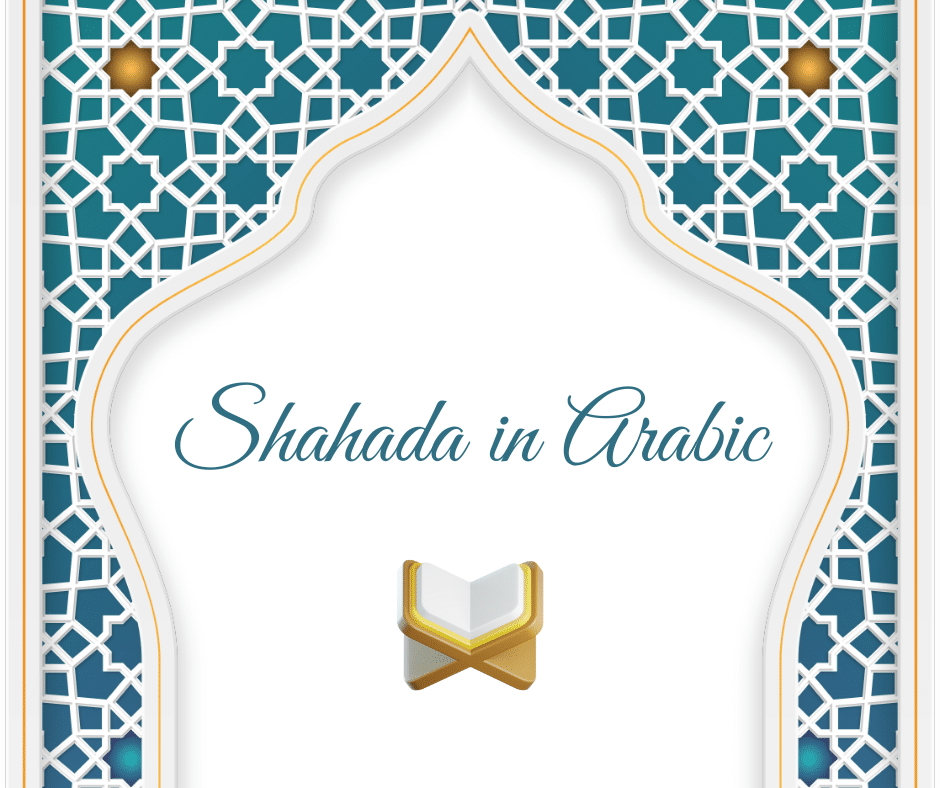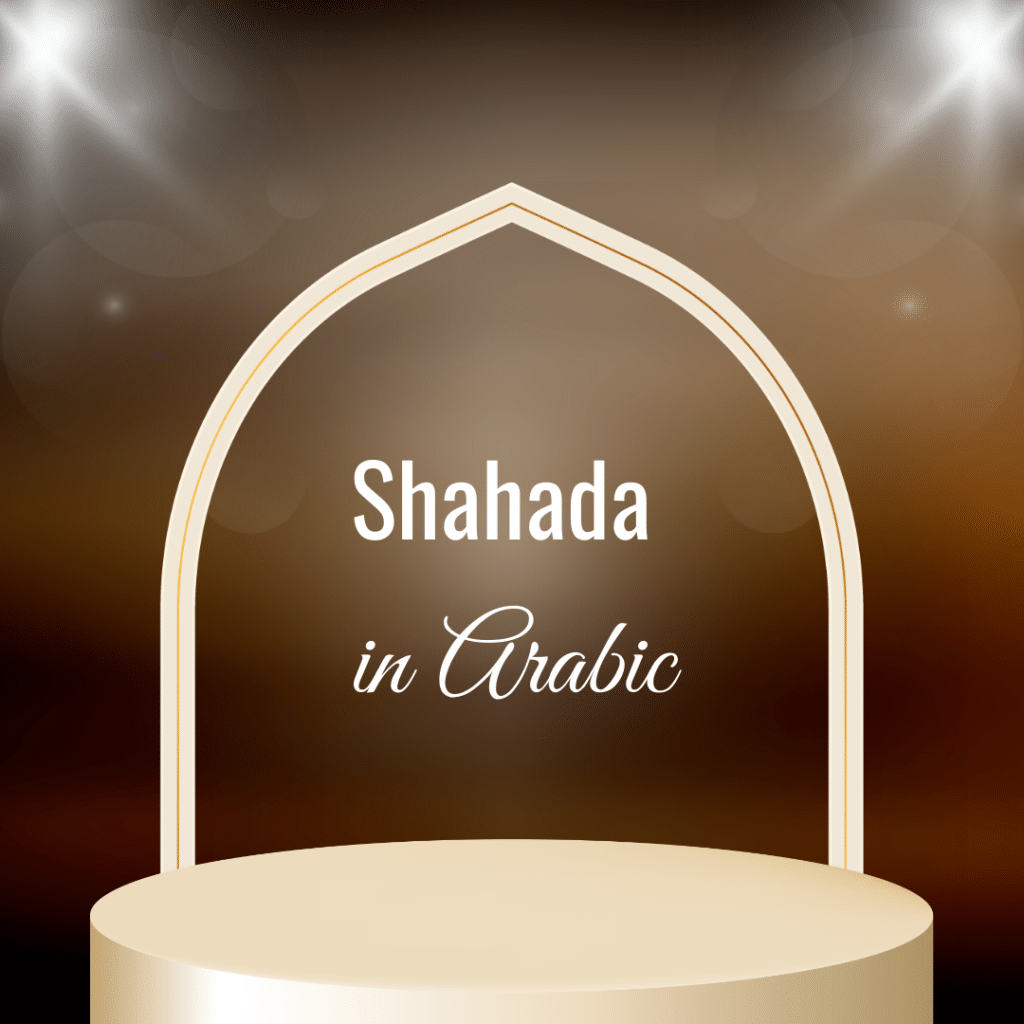Shahada in Arabic: The Arabic phrase for a statement of trust in one God (Allah) and His Messenger is the Shahada (Shahadah).Shahada in Arabic.
Shahada in Arabic
The Shahada in Arabic: a-ahda is a word also spelled Shahadah.
The Muslim proclamation of belief in God’s oneness and acceptance of Muhammad as his prophet is the Shahada.
The proclamation says L ilaha illa al-Lh, Muhammadun rasul l-Lh.
There is no god but God; Muhammad is God’s Messenger.
The Kalima, which means “words,” is the name given to this proclamation.
For Muslims, recitation of the Shahadah is the most significant of the Five Pillars of Islam, and it is done daily.
Non-Muslims who seek to convert to Islam must recite the creed in public.
The Shahadah is not a distinct pillar for the Shi’a, but it is linked to their beliefs.
What is the meaning of the Shahada?

“Ashadu a la ilaha illa illa-ilah, wa ashadu anna muhammadan rasul ullah,” in Arabic.
“There is no God but Allah (i.e., there is no one worthy of worship but Allah), and Muhammad is Allah’s Messenger.”
It is Islam’s most sacred declaration, and it must be said with complete comprehension and attention to its significance.
The Importance of Shahada in Arabic
The Importance of Shahadah, Islam’s First Pillar.
The first pillar of Islam is the Shahada or Kalima.
The first condition of becoming a Muslim, as we all know, is to believe and then act on that belief.
“LA-ILAHA-ILLA-ALLAH, MUHAMMADUR-RASUL-ULLAH” is the first pillar of Islam.
There is no God but Allah, and Muhammad (S.W.T.) is Allah’s Messenger.
The Shahadah or Kalima and faith are the most fundamental beliefs for Muslims since they summarise what one must believe to be a Muslim.
As a Muslim, the fundamental necessity of human beings is the first pillar of Islam. Says Prophet Muhammad (S.W.T.):
“I have been ordered to fight against people until they testify that there is no god but Allah and the Muhammad is the Messenger of Allah.” (Sahi Bukhari).
The above statement suggests that we must believe in both aspects of Islam’s first pillar.
History
Islam began with Hazrat Adam (A.S.) and ended with Prophet Muhammad (S.A.W.), Allah’s last Messenger. Allah Almighty states in the Holy Quran: Oh, Muhammad! (S.W.T.):
“This day have I perfected and fulfilled your religion for you, completed My favor upon you, and I have chosen for you Islam as your only Religion.” (Quran, 5:3)
God Almighty said in another surah of the Noble Qur’an:
“If anyone wishes to have a religion other than Islam, never will it be accepted by him.” (Quran, 3:85).
Since Muslims, we must inform the rest of the world that Islam is for all of Allah’s creations, as it is Almighty Allah’s sole Religion.
For the sake of his entire creation, he has created this Religion.
The first pillar of Islam, Kalima or Shahadah, begins with the fundamental belief in an unseen creator of the universe, Allah.
Although we have not seen Allah, we are taught to believe that there is no God but Allah and that Muhammad (S.A.W.) is Allah’s Messenger.
Shahadah or Kalima is divided into two parts:
- There is no God but Allah.
- Allah’s Messenger is Muhammad (S.W.T.).
We believe in Allah Almighty’s oneness in the first and second parts.
We believe that Muhammad (S.W.T.) is Allah Almighty’s last Prophet and Messenger.
The Kalima or Shahadah is the most important declaration in the Muslim Religion, and anybody who cannot repeat it from memory is not a Muslim.
Information about the Shahada

The Shahadah is one of Islam’s five pillars.
It is a precious testament that Muslims must preserve and embrace in all of their deeds and intentions throughout their lives.
The testimony is read in the call to prayer.
Muslims must say the Shahadah once or twice throughout their Salah, which they must complete at five separate times during the day.
When someone decides to convert to Islam.
They recite the Shahadah, which signifies their acceptance of Islam and their new life as Muslims.
The Shahadah is the first word a Muslim newborn hears when born.
And Muslims aim to have the Shahadah be their final word when they die.
The most critical times of saying Shahada in Arabic
Shahada in Arabic can be displayed at any time and from anywhere, but the essential times to say it are as follows:
For a new Muslim:
When a person converts or reverts to Islam, they should first say the Shahada.
It’s not just reciting; it’s saying something with total conviction.
In front of witnesses, the Shahadah is announced.
The Shahadah is the line that separates a non-believer (Kafir) from a believer (Muslim).
A Newborn Baby
The Adhan is lovingly murmured in the ears of a newborn Muslim infants when they are born.
It is usually done by the family’s elders in most cultures. Any adult, on the other hand, can do the Adhan.
Shahadah is one of the Adhan phrases.
Islam’s First Pillar
Shahadah is the first of the five pillars, indicating its significance to Muslims.
Only Shahadah supports the other four pillars.
For example, if a person fasts for the entire 30 days but does not believe in both portions of the Shahadah, the act of devotion is meaningless.
Emphasis on Monotheism
Shahada in Arabic serves as a continual reminder to both active Muslims and those considering joining the Islamic faith.
The reminder that Allah Almighty, while being invisible, is the ultimate ruler of all worlds.
The Shahadah prohibits shirk in any form.
As a result, nothing else should take precedence over worshipping One Allah.
Conclusion
Hence Reciting the statement of faith with maximum sincerity and commitment is known as Shahada in Arabic.
All other pillars of Islam must be followed in addition to Shahadah.
Shahadah is a beautiful word that every Muslim should repeat and act upon throughout life.
These Muslims will provide witness to their beliefs by their acts.
Consider Shahadah as a pillar that supports all of Islam’s other pillars.
Our other acts of devotion will be more beneficial if our confidence in Shahadah is more substantial.
Read More: What is the Shahada? – The Islamic Creed of Faith




